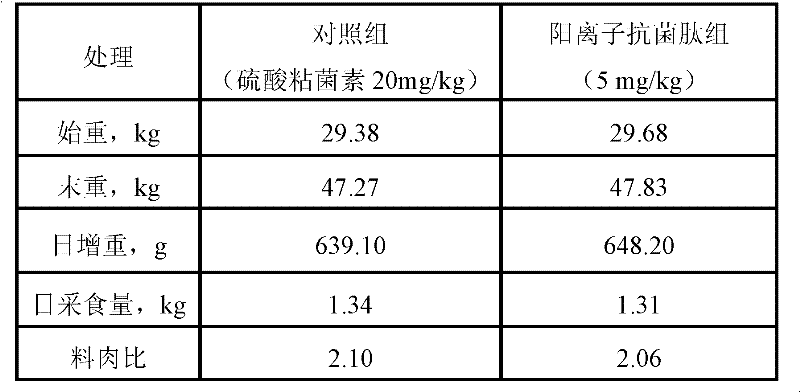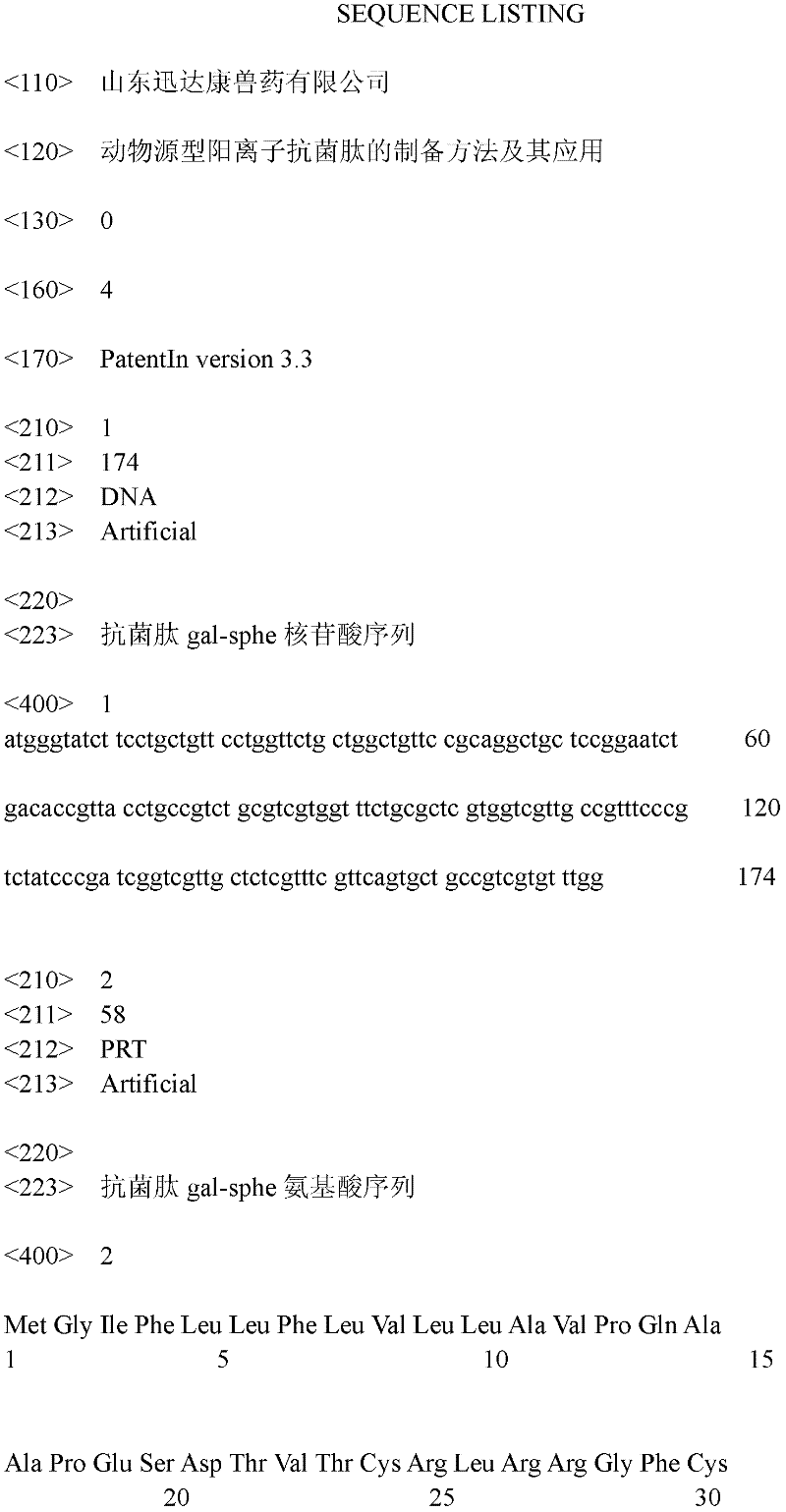Preparation method and application of animal-derived cationic antimicrobial peptides
An antibacterial peptide and cation technology, which is applied in the field of preparation of animal-derived cationic antibacterial peptides, can solve problems such as unproven safety and effectiveness of protein poultry and animals, and achieve improved feed returns and breeding profits, and broad-spectrum antibacterial effects. , the effect of high antibacterial activity
- Summary
- Abstract
- Description
- Claims
- Application Information
AI Technical Summary
Problems solved by technology
Method used
Image
Examples
Embodiment 1
[0031] The antimicrobial peptide gallinacin 14 N-terminal 1-24 amino acid residue fragment (MGIFLLFLVLLAVPQAAPESDTVT (SEQ ID NO.3)) and antimicrobial peptide Spheniscin-2 C-terminal 5-38 amino acid residue fragment (CRLRRGFCARGRCRFPSIPIGRCSRFVQCCRRVW (SEQ ID NO.4)) were hybridized ( That is to connect the two fragments) together, the amino acid sequence obtained is as follows: MGIFLLFLVLLAVPQAAPESDTVTCRLRRGFCARGRCRFPSIPIGRCSRFVQCCRRVW.
[0032] According to the above-mentioned amino acid sequence, the preferred codons of genetically engineered bacteria, that is, the commonly used codes of highly expressed genes, are used for amino acid encoding, and then with the help of DNA analysis software, the unsuitable part of the codon tandem organization is appropriately modified, adjusted and optimized (that is, the protein expressing the protein is selected. The host bacteria prefer to use amino acid codons to improve expression efficiency), and finally we get the optimized nucleotide se...
Embodiment 2
[0042] Cloning of antimicrobial peptide gene: clone the obtained antimicrobial peptide gene fragment (gal-sphe) into the selected vector IMPACT-CN, and then transform the plasmid (IMPACT-CN) into genetic engineering bacteria (ER2566), containing 100μg / ml ampicillin and medium coated with 20mg / ml X-gal, 1mM / ml IPTG (Tryptone: 10g / L, Yeast Extract: 5g / L, NaCl (sodium chloride) ): 10g / L, Agar agar 15g / L) culture (37°C, 12-16 hours), screen out colonies containing recombinant plasmid (IMPACT-CN-gal-sphe), and store the colonies at 4°C.
Embodiment 3
[0044] Expression and purification of antimicrobial peptides:
[0045] 1. Bacterial culture: directly take a single colony and add it to 1L LB liquid medium (containing 100μg / ml of ampicillin), and shake culture at 37°C until OD600 reaches 0.5-0.7. Note: You can pick a single colony newly transformed with recombinant expression plasmid, first inoculate it in 10ml liquid medium (containing 100μg / ml of ampicillin), culture with shaking at 37°C for 3-4 hours, and then inoculate it in 1L liquid medium (containing ampicillin) 100μg / ml), incubate at 37°C until OD600 reaches 0.5.
[0046] 2. Induce protein expression: add IPTG with a final concentration of 0.3 mM, culture with shaking at 37°C for 3 hours to induce protein expression. Set up a negative control. Sampling 10-20μl for SDS-PAGE electrophoresis, sampling 1-2μl for Western blot identification.
[0047] 3. Cell collection: Centrifuge at 5000×g for 10 minutes at 4°C and discard the supernatant. Store at -20 / -80℃. Freeze and tha...
PUM
 Login to View More
Login to View More Abstract
Description
Claims
Application Information
 Login to View More
Login to View More - R&D
- Intellectual Property
- Life Sciences
- Materials
- Tech Scout
- Unparalleled Data Quality
- Higher Quality Content
- 60% Fewer Hallucinations
Browse by: Latest US Patents, China's latest patents, Technical Efficacy Thesaurus, Application Domain, Technology Topic, Popular Technical Reports.
© 2025 PatSnap. All rights reserved.Legal|Privacy policy|Modern Slavery Act Transparency Statement|Sitemap|About US| Contact US: help@patsnap.com



